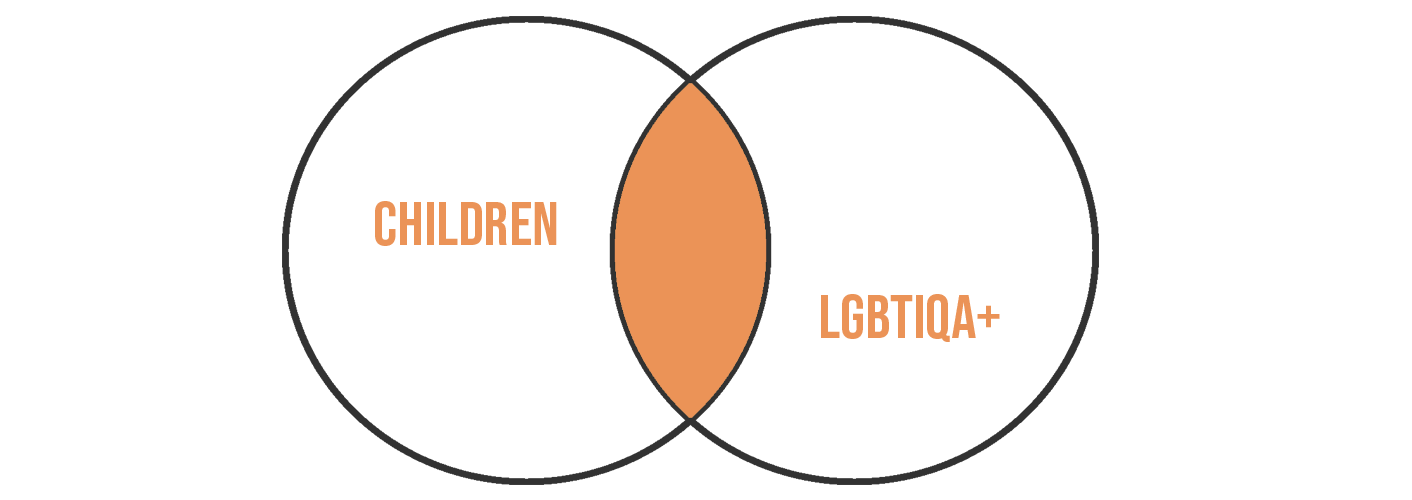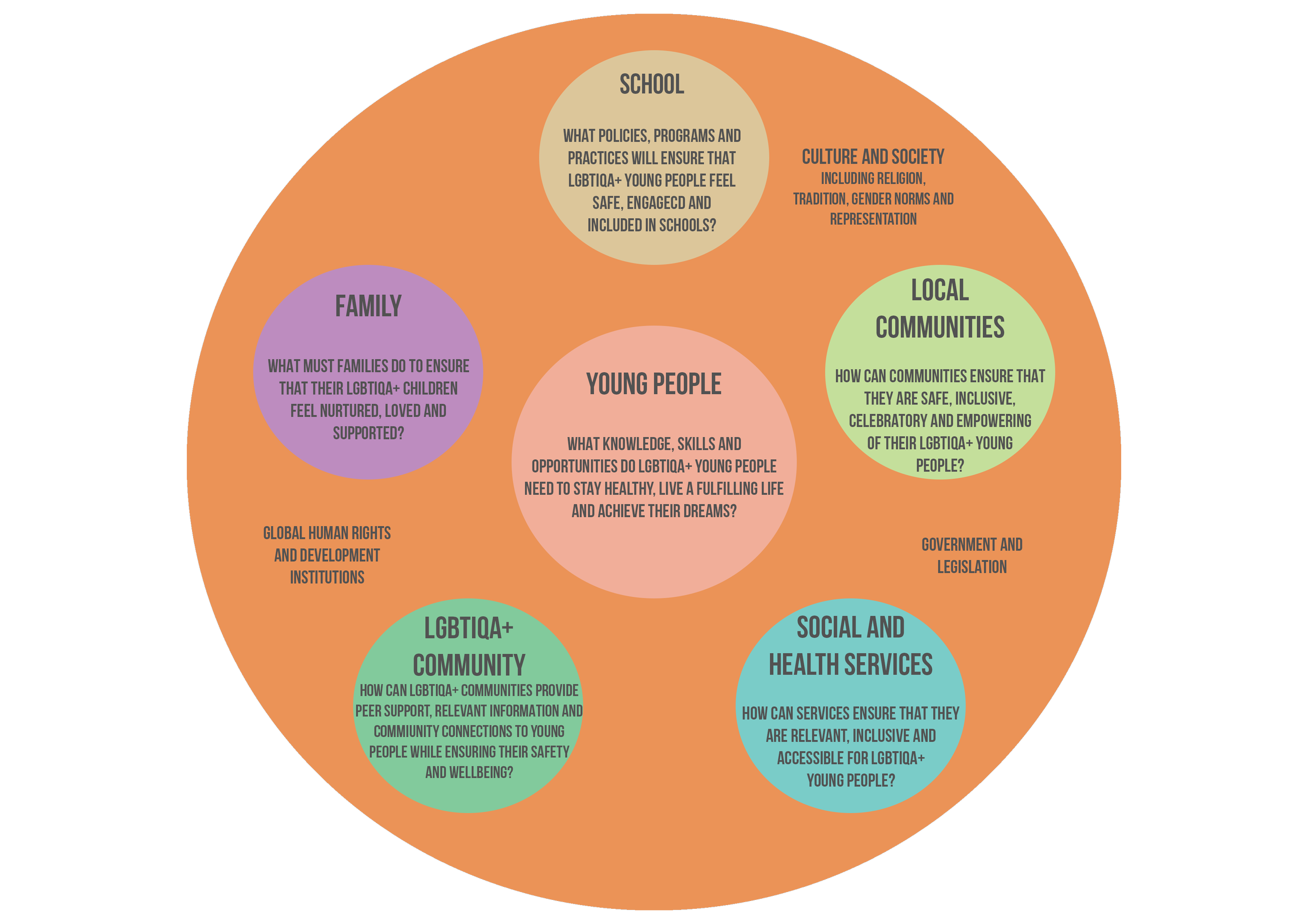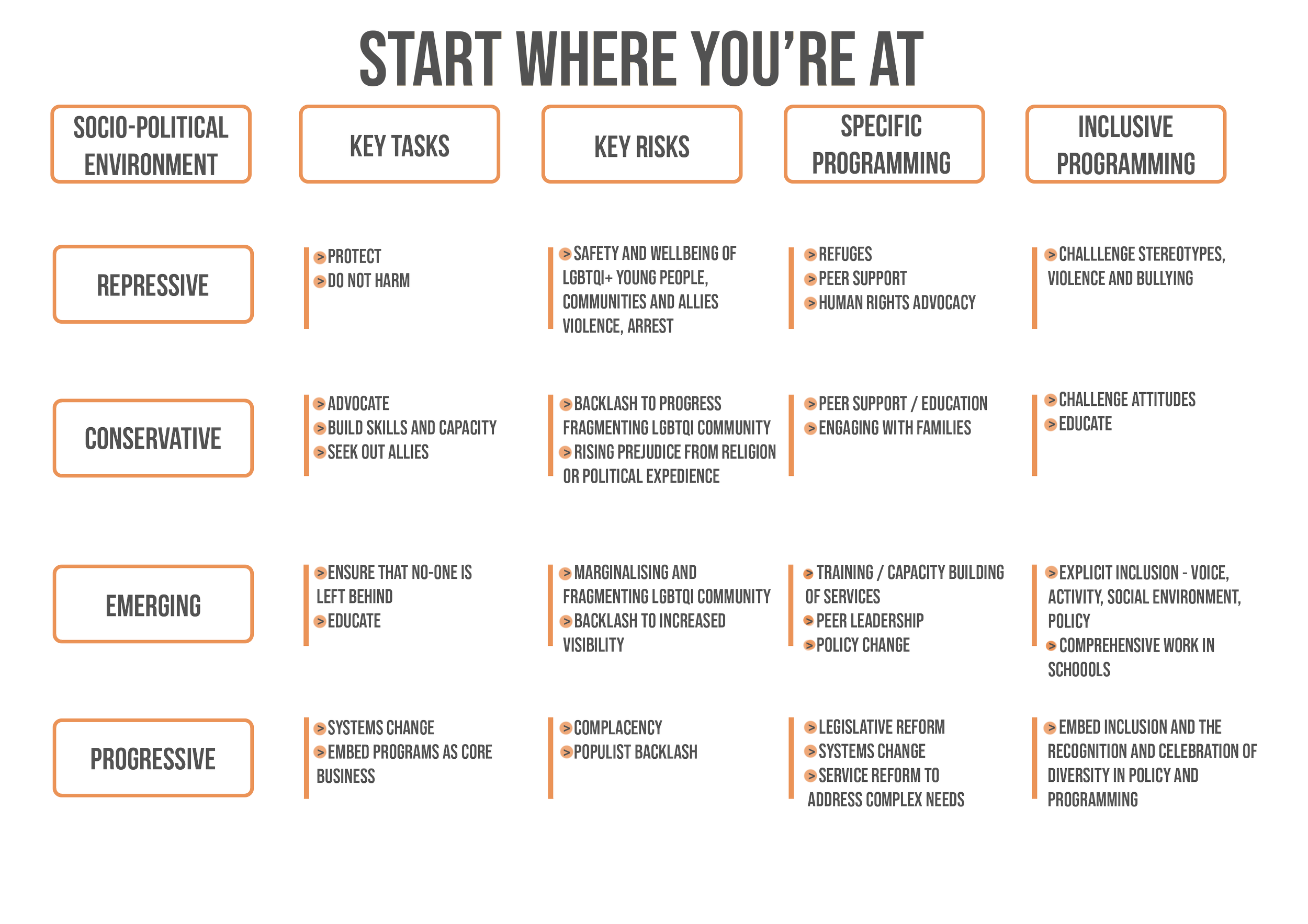WE ARE THE RAINBOW:
KEY CONCEPTS
The simple core concepts informing We Are The Rainbow are firstly the recognition that LGBTIQ+ children are both children and LGBTIQ+. They have the vulnerabilities and risks of children and the vulnerabilities and risks of LGBTIQ+ people, the rights accorded to all children and the rights accorded to all people regardless of their SOGIESC. Responses to health, safety and wellbeing concerns for LGBTIQ+ children must recognise these complex and interrelated risks and vulnerabilities, just as they must recognise children’s rights to special protection from abuse and harm and SOGIESC rights to sexual and cultural expression.
Secondly, WATR recognises that the challenges LGBTIQ+ children face are caused by social environments of prejudice, discrimination and exploitation, and are not an inherent problem of the children themselves. The work that needs to be done is to change the social environments that LGBTIQ+ children live, learn and play in, not the children themselves.
Thirdly, WATR acknowledges that the social environments that most impact on the lives of LGBTIQ+ children and young people, such as the family, the school and LGBTIQ+ communities, are themselves embedded in broader social structures shaped by forces including cultural and religious beliefs, long-held traditions, national legislation, norms around gender, sexuality and family structure, the colonial imposition of homophobic and transphobic legislation and scapegoating for political expedience. Together these forces either provide momentum and support for change or they block and threaten any progress. In environments of repression and state-supported persecution of LGBTIQ+ people our collective ways of advancing rights and recognising the needs of LGBTIQ+ children and young people will be very different from the ways we can work in more progressive environments, and the principle of DO NO HARM becomes even more important. At the same time, these environments of repression and persecution are where action is most needed, and doing nothing is not an appropriate response.
Finally, WATR is built on an understanding that every LGBTIQ+ community has unique experiences and needs, and LGBTIQ+ children and young people need opportunities to shape and lead the programs that advance their rights and wellbeing. WATR aims to create and share universal principles for effective action, summarise and promote an evidence base for the work, and develop and share strategies and tools, but does not mandate specific programs or activities. WATR is informed by Many Coloured Sky’s partnerships with LGBTIQ+ organisations, allied service providers and the ongoing participation and leadership of LGBTIQ+ children and young people, and Many Coloured Sky continues to fund and enable LGBTIQ+ youth-led groups to develop their own programs in their own ways. Many Coloured Sky is an organisation run by and for LGBTIQ+ people, and undertakes its work “peer to peer, queer to queer”.
INTERSECTIONAL VULNERABILITIES, INTERSECTIONAL RIGHTS
As framed by the Universal Declaration of Human Rights (1948), human rights are universal and indivisible, underpinned by the fundamental principles of equality and non-discrimination. This means that LGBTIQ+ children and young people have all the same rights as other humans, including all the rights of all children as recognised in the UN Convention on the Rights of the Child, and all the same rights to health (including sexual health), to identity and to bodily autonomy that all people have regardless of their SOGIESC.
At the same time, LGBTIQ+ children and young people face specific vulnerabilities because they are not adults, and because of assumptions and prejudices about people of diverse SOGIESC. These intersectional vulnerabilities lead to obvious and well-documented outcomes, such as family rejection leading to homelessness, and school bullying and harassment leading to fragmented or prematurely ended education, but Many Coloured Sky’s work developing We Are The Rainbow has also highlighted less well-known examples of poor outcomes for LGBTIQ+ children and young people. These include sexualisation of school students by their classroom teachers, the belief that LGBTIQ+ children have abdicated the right to protection that other children can expect because they’ve “chosen to be sexual”, economic exploitation by other young people in return for protection from homophobic and transphobic violence, sexual exploitation in LGBTIQ+ communities and the forced use of intersex children in street-corner begging.
These complex intersections require comprehensive approaches, informed by LGBTIQ+ children and young people themselves, and engaging multiple sectors of the community. WATR advocates for this to happen via work in the social environments that have the most impact on the lives of LGBTIQ+ children.
SOCIAL ENVIRONMENTS SHAPE WELLBEING AND LIFE OUTCOMES
We Are The Rainbow focuses on the key social environments in which LGBTIQ+ children live, learn and play. This locates the problems these children face in discrimination and prejudice, not in the young people themselves. It also recognises that families, schools, peer groups and local communities can be influenced and supported to change, through education, policy and programmatic responses. By focusing on near-universal social environments we can create change for large numbers of young people, and research shows that creating positive change in one key environment eg schools, helps to minimise the harms that come from abuse in other environments.
Everyone’s health and wellbeing, their educational attainment and employment options, their relationships and the likelihood that they will live in a safe and loving home are determined by the extent to which they are nurtured, included and celebrated in their family, their school, their local community and their peer groups, including same-age peers at school, and peer social spaces such as those created by and for LGBTIQ+ communities. If LGBTIQ+ children are rejected or abused in their families, bullied out of school, assaulted and exploited in their local communities, vulnerable in LGBTIQ+ community spaces and unable to safely access services to meet their needs, this will have significant and long lasting impacts on their lives.
To address this, WATR uses an environmental analysis to identify where LGBTIQ+ children are put at particular disadvantage or risk, either for being LGBTIQ+ or for being children. In LGBTIQ+ community environments, for example, they may be at risk of sexual exploitation because their special vulnerabilities as children are not recognised, while in their family home or their school they may be rejected or subject to abuse because they are LGBTIQ+. In some public environments they are doubly at risk – vulnerable to exploitation and harm as children, and vulnerable to harassment and discrimination as LGBTIQ+. Beyond identifying risks and vulnerabilities, WATR’s environmental analysis identifies key areas of policy and service delivery in health, education, community and safety, to develop a comprehensive and holistic response to the needs of LGBTIQ+ children.
WE ARE THE RAINBOW’S FOCUS IS ON SOCIAL ENVIRONMENTS THAT HAVE THE MOST IMPACT ON LGBTIQ+ YOUNG PEOPLE’S LIVES – PEERS, FAMILY, SCHOOL, LOCAL COMMUNITIES, SOCIAL SERVICES AND LGBTIQA+ COMMUNITIES
This targets our work and our effort to the places where we can make the most difference, shapes our advocacy, focuses on measurable change and supports LGBTIQ+ young people where they live, learn and play.
Each of the social environments in which LGBTIQ+ children live can be a safe and inclusive space, or a negative, discriminatory space.
A focus on key social environments also allows us to determine incremental steps towards change, considering the policies, education, professional development, social supports and relationships that are required to ensure that schools, health and community services, child and adolescent services, families and communities are inclusive and safe for all children regardless of their sexuality, gender or sex characteristics.
We Are The Rainbow shares principles, strategies, tools and resources to support positive change in the social environments that are most common and impactful for LGBTQI+ young people.
THE WE ARE THE RAINBOW FRAMEWORK BRINGS TOGETHER UNIVERSALLY APPLICABLE PRINCIPLES AND INSIGHTS WITH TOOLS AND ACTIVITIES THAT CAN BE SHAPED TO LOCAL CONTEXTS
LGBTIQ+ people in their own communities and countries need to lead the work of creating positive change in the social environments in which LGBTIQ+ children live, supported by the resources, networks and skills of genuine allies. They will understand the culture, history and laws that shape the experiences of LGBTIQ+ children in that place and time, and where the process of creating positive change can begin.
We Are The Rainbow aims to support this by providing strategies, resources and tools that can be adapted to local contexts, and by learning from and sharing the successes and challenges from different communities in different countries.
WATR is fundamentally focused on the recognition and advancement of LGBTIQ+ children and young people’s rights. We recognise that some LGBTIQ+ organisations and groups may not have a clear understanding of child rights and how to implement child safety policies. WATR resources include support for developing child-safe policies and practices, while we also recognise the value of child welfare organisations and community service providers as allies who can work alongside LGBTIQ+ organisations to ensure that programs developed for LGBTIQ+ children and young people are not only LGBTIQ+ inclusive and safe, they are also child safe.
GUIDELINES AND PRINCIPLES TO SUPPORT GOOD PRACTICE
Every community has unique strengths and challenges when it come to affirming the rights of LGBTIQ+ children and young people and ending prejudice and discrimination. This is one of many reasons why it is essential that LGBTIQ+ young people and communities are empowered to lead the work of changing their worlds, supported by the resources, networks and skills of genuine allies. At the same time, there are principles and strategies for this work that are universal. The Guidelines supporting the implementation of We Are The Rainbow projects aim to distil the learnings of Many Coloured Sky and our partners in the delivery and support of programs for LGBTIQ+ children and young people, working towards the development and recognition of universal best-practice guidelines. The guidelines follow the We Are The Rainbow framework in focusing on key social environments in which LGBTIQ+ children and young people live, learn and play – LGBTIQ+ peer groups, families, schools, social and health services and local communities. In presenting these, we recognise the legislative, religious and cultural barriers many communities face in addressing prejudice against SOGIESC minorities, leading to a first important guideline – START WHERE YOU’RE AT. As with all of our work, we aim to adapt and further develop these guidelines as we learn from and engage with our community partners and their unique experiences.
The START WHERE YOU’RE AT guideline aims to be more than just an acknowledgement that in many countries and communities activities such as peer support or working with schools may not be possible or safe. While it is essential that we do not undertake activities in communities that create a significant risk of harm to LGBTIQ+ children or adults, it is also essential that we do what we can to progress LGBTIQ+ rights, recognition, safety and opportunity.
The table below aims to stimulate thinking about which kind of programs may work best depending on the socio-political attitudes towards LGBTIQ+ people. It is not exhaustive and does not suggest that LGBTIQ+ communities can do this work alone.
THIS WORK MUST BE DRIVEN BY YOUNG PEOPLE AND THEIR HOPES, DREAMS, EXPERIENCES AND AMBITIONS
All of Many Coloured Sky’s work on We Are The Rainbow is informed by the experiences, hopes and ambitions and the direct input of LGBTIQ+ children and young people young people, as well as the broader LGBTIQ+ community, families and key service providers. We ensure that the input of children is sought in multiple ways, with specific focus on safety and inclusion of diverse voices and experiences. We Are The Rainbow provides opportunities for young people to lead in peer support, advocacy and shaping the way WATR works with parents, schools, service providers and community leaders.
HOW THE WATR APPROACH LINKS TO ADVOCACY AND SOCIAL CHANGE
The primary focus of WATR at this time is the development of community-based and community-led programs that enhance the safety, inclusion, nurture and opportunity of LGBTIQ+ children and young people in the places where they live, learn and play. While this may not look like traditional advocacy, we believe that it directly contributes to advocacy and social change outcomes in the following ways -
Social environments are where our rights are enacted - by developing and promoting good practice our work highlights specific areas where focused attention is required on children’s rights and SOGIESC rights
The peer group is the platform for advocacy and change - Nothing about Us without Us! Our work builds opportunities for the opinions and concerns of LGBTIQ+ young people to be heard in advocacy focused on their rights
WATR builds the capacities and networks of LGBTIQ+ communities and the vision of a world without discrimination - the work we undertake builds the skills, networks and resources of LGBTIQ+ organisations
Parents as allies and advocates - by giving space to parents and families to better understand their LGBTIQ+ children we encourage and enable them to advocate for their children’s rights
Generational change - young people become voting adults and community leaders. By building the skills and confidence of LGBTIQ+ young people and normalising diverse SOGIESC in schools and local communities we create a generation that can move beyond prejudices of the past
Connected advocacy - by bringing together various project partners, advisory groups and allies we support advocacy-focused discussion that has diverse input, and provides a platform from which to promote ideas driven by LGBTIQ+ young people
In-project advocacy - Many Coloured Sky has funded and supported some projects with an explicit advocacy focus, such as Inti Mudah Jawa Barat’s project in Indonesia focused on ending sexual exploitation of peer workers in HIV education programs.


